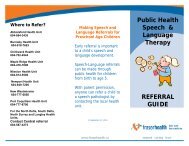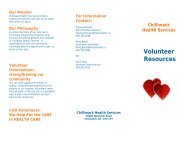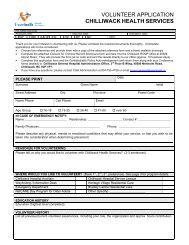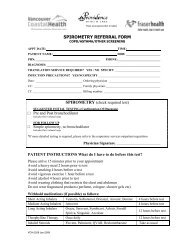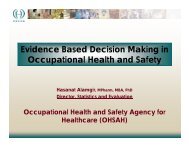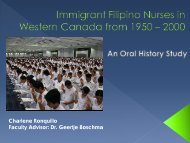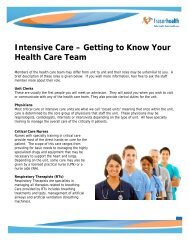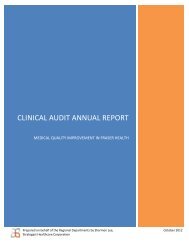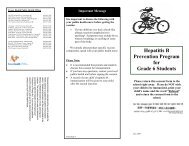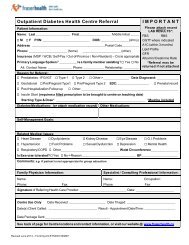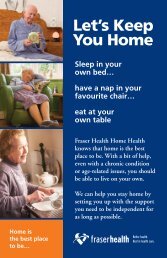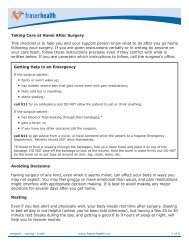Community-based Research - Fraser Health Authority
Community-based Research - Fraser Health Authority
Community-based Research - Fraser Health Authority
Create successful ePaper yourself
Turn your PDF publications into a flip-book with our unique Google optimized e-Paper software.
<strong>Community</strong> Based <strong>Research</strong><br />
With a Lens on Aging and Gender<br />
Exploring Connections and Fostering<br />
Collaboration<br />
Elana Brief, PhD<br />
Women’s <strong>Health</strong> <strong>Research</strong> Network<br />
Bobbi Symes, MA<br />
BC Network on Aging <strong>Research</strong>
Goals<br />
By the end of the workshop participants will be able to:<br />
• articulate the potential of community<br />
<strong>based</strong> research<br />
• feel inspired to consider research<br />
questions that emerge from their work<br />
• identify potential collaborators<br />
• seek out resources to support them in<br />
pursuing their research questions
Plan for today<br />
• Wearing multiple hats<br />
• What is <strong>Community</strong> Based <strong>Research</strong>?<br />
• Different roles and opportunities<br />
• Asking meaningful questions<br />
• Who else to involve?<br />
• Additional resources
Expertise in the Room<br />
How would I describe myself?<br />
A) Academic <strong>Research</strong>er / Student / <strong>Research</strong> Assistant<br />
B) <strong>Community</strong> Based <strong>Research</strong>er<br />
C) <strong>Health</strong> Care Provider<br />
D) <strong>Community</strong> Service Provider<br />
E) Policy Developer / Analyst<br />
F) <strong>Research</strong> Participant<br />
G) Other
Desire to do <strong>Research</strong><br />
Why do I want to engage in research?<br />
A) Need more evidence for decisions I make<br />
B) Need more evidence to convince decision makers<br />
C) Want to make a bigger difference<br />
D) I like details and data<br />
E) <strong>Research</strong> is necessary to get funding for my unit<br />
F) Build my portfolio to apply for grad school<br />
G) I’m a researcher looking for a good question<br />
H) Other?
Engaged in <strong>Community</strong> Based <strong>Research</strong>?
<strong>Community</strong> Based <strong>Research</strong><br />
“… conducted by, for and with the participation<br />
of community members…. <strong>Community</strong> <strong>based</strong><br />
research aims not merely to advance<br />
understanding, but also to ensure that<br />
knowledge contributes to making a concrete and<br />
constructive difference in the world”.<br />
(The Loka Institute, 2002)
Multiple, Overlapping Terms…<br />
• Collaborative research<br />
• Participatory research<br />
• Participatory action research<br />
• Action research<br />
• Feminist action research<br />
• Feminist‐informed participatory action research<br />
• <strong>Community</strong>‐<strong>based</strong> participatory research<br />
• <strong>Research</strong> in practice<br />
And so on!<br />
What they have in common:<br />
•Seek multiple perspectives.<br />
•Goal of the research is<br />
measurable change.
Relationships in “Traditional <strong>Research</strong>”<br />
I know you only as a<br />
subject.<br />
My academic colleagues<br />
and I have full control<br />
over the study.<br />
This is the first and last<br />
time we meet.<br />
I help out with the project.<br />
I have no input into the<br />
question or design.<br />
I know you only as a<br />
researcher.<br />
I do not contribute to<br />
research question, design,<br />
analysis or dissemination.<br />
I have no access to the<br />
results.
Democratizing <strong>Research</strong><br />
Ritas, C. (2003). Speaking Truth, Creating Power: A Guide to Policy Work for <strong>Community</strong>‐Based Participatory<br />
<strong>Research</strong> Practitioners. New York NY, Hunter College Center on AIDS, Drugs and <strong>Community</strong> <strong>Health</strong> For <strong>Community</strong>‐<br />
Campus Partnerships for <strong>Health</strong>.
Examples of Roles<br />
Formulating<br />
the <strong>Research</strong><br />
Question<br />
Designing<br />
Method<br />
Data<br />
Collection<br />
Data Analysis<br />
Dissemination<br />
and Action<br />
academic<br />
researcher<br />
clinical<br />
researcher<br />
community<br />
<strong>based</strong><br />
researcher<br />
service<br />
provider<br />
policy maker<br />
patient / client
Individual Exercise: What do I like to do?<br />
You’ll have 5 minutes to reflect on these questions. This is just for you –you will not be<br />
asked to share your responses.
What Comes of the Results?<br />
academic<br />
literature<br />
previous<br />
research<br />
<strong>Research</strong><br />
Question<br />
academic<br />
collaborators<br />
academic<br />
literature /<br />
grey literature<br />
community<br />
activists<br />
service<br />
delivery<br />
question<br />
previous<br />
research<br />
CBR<br />
<strong>Research</strong><br />
Question<br />
academic/community<br />
collaborators<br />
community<br />
needs<br />
assessment<br />
policy issue<br />
or question<br />
collaborative<br />
research process<br />
increased<br />
research skills<br />
Results of<br />
<strong>Research</strong><br />
policy<br />
change<br />
Results of<br />
<strong>Research</strong><br />
grey<br />
literature<br />
community<br />
action<br />
academic<br />
literature<br />
best<br />
practices<br />
academic<br />
literature
How to build a research team?
Individual and Group Exercises
Networking Survey<br />
What best describes you?<br />
A) Enthusiastic networker<br />
B) Reluctant, but adequate networker<br />
C) Shy, but I’ll meet people<br />
D) I skip all the networking events I can
Awkward Beginnings<br />
Exercise<br />
groups of TWO for 1 minute<br />
say full NAME<br />
(don’t mumble or<br />
cover your mouth)<br />
Hello,<br />
I’m Elana Brief<br />
Ahem…
Making Connections<br />
Having a GOAL helps to connect with others<br />
1. Like minded people<br />
• Asking the same types of questions<br />
• Working with the same populations<br />
2. Complementary skills<br />
• Good at different stages of research<br />
3. Growing partnerships<br />
• Working in different sectors<br />
Determines how<br />
the conversation<br />
will proceed
Promoting Self and Others<br />
Exercise<br />
On your own<br />
1. Reflective Exercise (to come)<br />
2. Answer questions:<br />
• Who am I?<br />
• Two minute blurb: personal research interest.<br />
With a partner<br />
1. Say your name clearly.<br />
2. Say your blurb to each other.<br />
3. Give feedback.<br />
Enlarging your network<br />
1. “Work” the room.<br />
2. Meet people you don’t know.<br />
3. Introduce new people to people you already know.
Advice to the Shy (or Tired)…<br />
It is when people really listen to us, with quiet, fascinated attention,<br />
that the little fountain [inspiration, engagement, enjoyment] begins<br />
to work again, to accelerate in the most surprising way.<br />
I discovered all this about three years ago, and truly it made a<br />
revolutionary change in my life. Before that, when I went to a party,<br />
I would think anxiously: "Now try hard. Be lively. Say bright things.<br />
Talk. Don't let down." And when tired, I would have to drink a lot of<br />
coffee to keep this up.<br />
Now before going to a party, I just tell myself to listen with affection<br />
to anyone who talks to me, to be in their shoes when they talk; to<br />
try to know them without my mind pressing against theirs, or<br />
arguing, or changing the subject.<br />
‐ Brenda Ueland
Reflection: Approaching a <strong>Research</strong> Question<br />
myself<br />
What do I care<br />
about?<br />
my/our context<br />
social<br />
economic<br />
political<br />
What is possible?<br />
What can I do right<br />
now?<br />
What’s my<br />
question?<br />
my co‐researchers<br />
my co‐workers<br />
my neighbourhood<br />
my community<br />
my/our concerns<br />
How do my concerns<br />
fit with others’<br />
concerns?<br />
What questions or<br />
concerns do I have in<br />
my daily life or work?
Individual Exercise: What’s My Question?<br />
You’ll have 15 minutes to reflect on these questions. This is just for you –you will not be<br />
asked to share your responses.
Fact or Fiction?<br />
FACT<br />
Dark Chocolate is <strong>Health</strong>y:<br />
Chocolate is made from plants, which means it contains many of the<br />
health benefits of dark vegetables. These benefits are from flavonoids,<br />
which act as antioxidants. Antioxidants protect the body from aging<br />
caused by free radicals, which can cause damage that leads to heart<br />
disease. Dark chocolate contains a large number of antioxidants (nearly<br />
8 times the number found in strawberries). Flavonoids also help relax<br />
blood pressure through the production of nitric oxide, and balance certain<br />
hormones in the body.<br />
……at least that’s our excuse
Guidelines for Exercise<br />
Exercise<br />
On your own<br />
1. Reflective Exercise<br />
2. Answer questions:<br />
• Who am I?<br />
• Two minute blurb: personal research interest.<br />
With a partner<br />
1. Say your name clearly.<br />
2. Say your blurb to each other.<br />
3. Give feedback.<br />
Enlarging your network<br />
1. “Work” the room.<br />
2. Meet people you don’t know.<br />
3. Introduce new people to people you already know.
Large Group Discussion<br />
1.What surprised you?<br />
2.What challenged you?<br />
3.What questions do you still have?
Resources from BCNAR and WHRN
Our Common Ground – Goals of Publication<br />
research in girls’<br />
and women’s health<br />
action <strong>based</strong> on research
What’s In Our Common Ground?
Definitions and Philosophy
Roles and Responsibility
<strong>Research</strong> Strategies
Celebrating Action
Worksheets for Discussion
<strong>Research</strong> Primers<br />
Sex & Gender<br />
<strong>Health</strong> Determinants<br />
Intersectionality<br />
<strong>Community</strong> Based <strong>Research</strong><br />
www.whrn.ca<br />
Downloadable
Conference Reports<br />
Aging Well in Northern, Rural and<br />
Remote Communities<br />
Promoting Active Aging by Connecting<br />
BC <strong>Research</strong>ers and Communities<br />
Gender, Gerontology and Geography<br />
The Assisted Living Model<br />
www.bcnar.ca
<strong>Health</strong> Data Links –The Source<br />
www.womenshealthdata.ca
<strong>Health</strong> Data Links –The Source<br />
www.womenshealthdata.ca
Grey Literature Search<br />
www.womenshealthdata.ca
Peer Reviewed Publications Database<br />
www.bcnar.ca
Searchable Member Database<br />
www.whrn.ca<br />
www.bcnar.ca
Online Meetings for Network Members<br />
WHRN and BCNAR members have access to WebEx for free longdistance<br />
telephone and internet‐<strong>based</strong> meetings.
Resources Available<br />
Downloadable podcasts<br />
Announcements about<br />
events, jobs, funding and<br />
publications
Resources Available
Become a Member (FREE)
Become a Member (FREE)
Goals<br />
By the end of the workshop participants will be able to:<br />
• articulate the potential of community<br />
<strong>based</strong> research<br />
• feel inspired to consider research<br />
questions that emerge from their work<br />
• identify potential collaborators<br />
• seek out resources to support them in<br />
pursuing their research questions<br />
www.whrn.ca<br />
www.bcnar.ca



